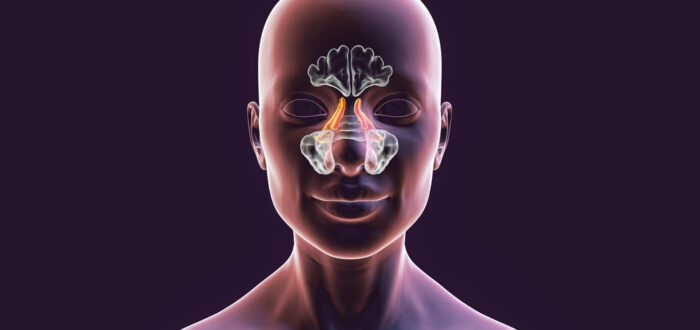Chronic sinusitis, a persistent inflammation of the sinuses that affects millions each year, can significantly impact one’s quality of life with symptoms like nasal congestion, pain, and pressure. But did you know that chronic sinusitis can also affect your hearing?
To better understand how sinus health might influence auditory function, let’s examine the relationship between chronic sinusitis and hearing loss.
Understanding Chronic Sinusitis
Chronic sinusitis occurs when the sinus cavities and nasal passages become inflamed for more than 12 weeks. This condition can persist for twelve weeks or longer, despite medical treatment, and can lead to difficulty breathing through the nose, facial pain, and a reduced sense of smell and taste. The persistent inflammation can block the drainage of mucus, causing it to build up and potentially lead to infections.
How Chronic Sinusitis Can Affect Hearing
The link between chronic sinusitis and hearing loss is primarily due to the proximity of the sinuses to the ear region. Here are a few ways sinusitis can potentially influence your hearing:
- Eustachian Tube Dysfunction: The Eustachian tubes, which connect the middle ears to the throat, help regulate ear pressure and drain fluid from the middle ear. When sinusitis causes inflammation, these tubes can become blocked, leading to a condition known as Eustachian tube dysfunction. This can cause a feeling of fullness in the ears, discomfort, and hearing difficulties.
- Middle Ear Infections: Sinusitis often leads to excess mucus and fluid buildup, which can migrate to the Eustachian tubes and middle ear, creating an environment ripe for infection. Middle ear infections (otitis media) can cause temporary hearing loss and, if recurrent or poorly managed, might lead to more permanent damage.
- Conductive Hearing Loss: This type of hearing loss occurs when something blocks or impairs the transmission of sound from the outer to the inner ear. The swelling and blockage caused by sinusitis can act as such a barrier.
Diagnosing and Treating Related Hearing Loss
If you’re experiencing hearing loss and suspect it might be related to chronic sinusitis, consulting with a healthcare professional is crucial. They can assess the cause of your hearing loss and the extent of your sinus issues. Treatment might include:
- Medications: Antibiotics, decongestants, nasal corticosteroids, or other medications can help reduce inflammation and clear blockages affecting the Eustachian tubes.
- Surgery: In severe cases, surgery might be necessary to clear the sinuses and restore normal function.
- Hearing Aids: If hearing loss persists, hearing aids may be recommended to improve auditory function.
Prevention and Management
Managing chronic sinusitis effectively can help mitigate its impact on your hearing. Regular check-ups, staying hydrated, using humidifiers, and avoiding irritants such as tobacco smoke are essential preventive measures. Additionally, treating sinusitis promptly and adequately can prevent complications like hearing loss from developing.
Need Help? Have a Question? Contact Us Today!
At REM Audiology, our hearing care professionals are on hand to help you with your hearing needs. Hearing assessments are quick and painless, and treating your hearing loss can go a long way towards improving your quality of life. To book your appointment, call us today on (888) 710-5734. Alternatively, click here to contact us online.

